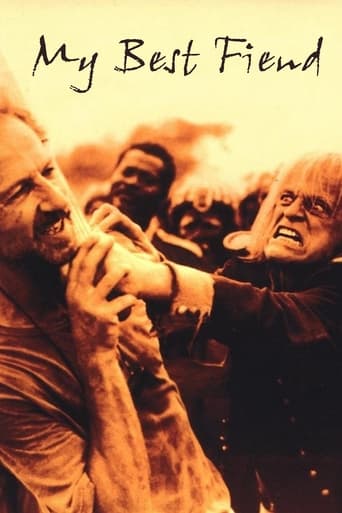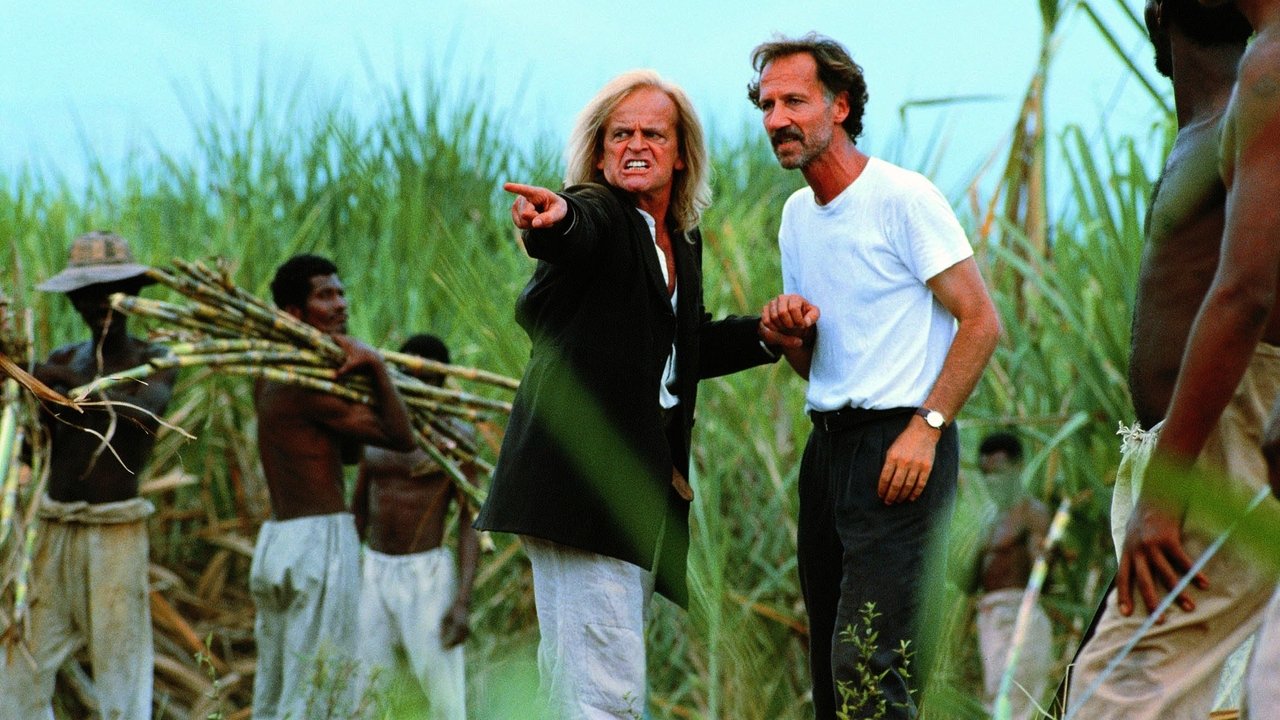framptonhollis
During Werner Herzog's "My Best Fiend", I couldn't help but find myself utterly shocked, despite already having some knowledge of Klaus Kinski's infamous behavior and madness. Who wouldn't be shocked after hearing some of Herzog's stories about the man?"My Best Fiend" is a documentary about Herzog's complicated, love-hate relationship with actor Klaus Kinski, who acted in five of Herzog's films. No other filmmaker was able to work with Kinski more than once, but Herzog is not like many other filmmakers, and this documentary is not like many other documentaries. It's a very personal film, and most of it is Werner Herzog telling mind boggling stories about his relationship with Kinski. It explores both Kinski's frightening insanity, and his sweeter, lovable side. What was perhaps most shocking about Kinski was not his temper and madness, but his kindness.This film works as a brilliant character study of an infamous actor, and it also provides the viewer with a glimpse into one of the strangest actor-director friendships of all time. It's also enormously entertaining, bizarre, and, at times, somewhat comic.
Horst in Translation (filmreviews@web.de)
"Mein liebster Feind" or "My Best Fiend" is a West German documentary film from 1999 and writer and director closed the old millennium on a very personal and very convincing note with this 95-minute film here. The main character of this film is occasionally listed as well in the title. It is the blonde acting infant terrible Klaus Kinski. He had already been dead for five years when this movie was made and it is somehow Herzog's farewell to his longtime collaborator. The duo worked together on a handful of film's that are widely considered among the finest from Herzog's and Kinski's bodies of work. Watching this film we find out that Herzog also brought a certain deal of insanity himself that helped him with coping of the character that was Kinski. And of course, Herzog also brought a great deal of dedication and this becomes obvious in several scenes here. One would be when Herzog tells us in one scene how Kinski was so angry he was about to leave the set and not return in the middle of filmmaking, when Herzog grabbed a gun and told Kinski he would not get very far before Herzog puts eight bullets in Kinski's head and one in his own. This part describes the documentary very well. A lot of it is about the creative clashing between the two protagonists and how insanity was always very close to genius in their cases. Herzog plays a big role of course as he is narrating this one and his fate is linked closely to Kinski's, but you never feel that this documentary is about anybody else than Klaus Kinski.Herzog travels to all kinds of places where he and Kinski worked together in the past, especially film locations, but also to places that just united him in a different manner. One example for the latter would be the apartment in the very first scenes. Herzog tells us how he kept verbally abusing everybody in there when he lived in this apartment and how he destroyed the bathroom in his rage and attacked a journalist. The journalist called Kinski excellent and Kinski lost it and attacked the man saying he was not excellent he was God-like. So yeah, this is a recurring theme in here. Kinski was an egomaniac of the worst kind and Herzog keeps mentioning scenario in which Kinski proved it again and again. There are also interviews with people Kinski acted together in Herzog's films, such as Eva Mattes and Claudia Cardinale. These two describe a very different Klaus Kinski, a sensitive, fragile man who was very shy at times. Maybe this is what Kinski was like towards his female co-actors. But it somehow fits and I almost never had the expression that Herzog or anybody else was making things up in here although Herzog easily could have taking into account how a great storyteller he is.All in all, this was a tremendous documentary I think. It told us in detail about the extremes that made Kinski such a unique character and actor. And you have to decide for yourself if this was a good or bad thing. Nobody probably could have told it better than Herzog because of all the time the two spent together and the film is a mix of current (well from 1999) video recordings and old recordings that show Kinski in action, for example how he attacks crew members or also scenes from his one-man stage performance as Jesus. We find out that Kinski often did not manage to get out of character in time for future projects and the attacks I just mentioned frequently happened when he did not learn his lines properly, so he would try to blame other uninvolved people to hope nobody recognizes his failures. Of course, this documentary was made before these accusations about pedophilia and incest from one of his daughters, which put the character into an entirely different light if these are true. I think it is impossible to separate the private person Klaus Kinski from the actor Klaus Kinski, but maybe this is the reason that allowed him to reach great high and give stunning performances again and again. I don't know. But I do know that I highly recommend these slightly under 100 minutes. A must-see for everybody who likes Kinski and/or Herzog.
museumofdave
It is the collaborations that Herzog and his supposed nemesis Kinski shared that astound one, and this bit of artistic self-aggrandizement is certainly interesting, but not as fascination as Herzog's interview in Burden Of Dreams, an addition to the feature made just recently.Do we really need to see Kinski losing it, ranting injudiciously under the pressure of filming in the jungle to appreciate his major accomplishment as Fitzcarroldo? I think not--in it's own way, this is rather like a good Michael Jackson documentary--how much of the peeping Tom in ourselves do we want to admit? Hitchcock asked the same question when he made REAR WINDOW--are we looking for information or are we merely voyeurs? In order to fully appreciate the magnificent achievement of Fitzcarroldo, that mad vision of megalomania on the Amazon, is it really necessary to see a pair of pesky individuals tear one another apart for the cameras? My Best Fiend is certainly not a bad examination of two offbeat individuals in conflict--I think your judgement of the film depends a good deal on your tolerance for this kind of immersion in personal dysfunction.
GeneSiskel
Klaus Kinski was an extraordinary method actor. More than that, the camera loved his face. Unfortunately, he was also quite mad, given to manic outbursts, to fits of rage, to outrageous behavior, both on and off the set. This documentary by Werner Herzog, who directed Kinski five times, is, I believe, neither exaggerated nor ironic, as has been suggested elsewhere. It is dead-on honest in its depiction of Kinski's willfulness, like a character conceived by Dostoyevski. But it is too much. Herzog and the wonderful Eva Mattes do recall sometimes sensitive and playful sides to Kinski, and footage from "Aguirre" and "Woyzeck" demonstrate Kinski's ability to fully inhabit his more than edgy characters, but otherwise what we see for 1:39 is the acting out of one unmitigated monster. There are at least two reels too much here. I loved "Fitzcarraldo" and "The Making of Fitzcarraldo," but I found this documentary -- Fitzcarraldo twice removed -- a bit tiresome and repetitive.



 AD
AD



